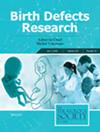Functional Evaluation of Neural Tube Defect-Related Missense Mutations Using In Silico Methods
Abstract
Background
Neural tube formation is one of the most important developmental events as it gives rise to the key organs comprising the central nervous system. Failure in the proper closure of the neural tube results in congenital abnormalities, namely neural tube defects (NTDs). Previous studies have identified several single nucleotide variations that are considered risk factors and established a genetic background for the increased incidence of NTDs and factors. This study aims to provide a comprehensive functional analysis of NTD-related missense mutations in terms of their potential effects on pathogenicity, protein stability, and structure using predictive in silico analysis tools.
Methods
Single nucleotide variations associated with NTD risk were identified by a systematic review of previous studies on Pubmed and ClinVar. Protein stability and pathogenicity scores were predicted using MUpro and PloyPhen2, respectively. Structural alterations were determined via the HOPE server. Predicted expression profiles in the brain were retrieved from the Human Protein Atlas.
Results
Our analysis identified 43 NTD-related missense mutations in MTHFR, MTRR, PARD3, PACS1, MED12, VANGL1, VANGL2, FZD6, CELSR1, FUZ, DVL2, and LRP6 genes. We found that all of these genes are predicted to be expressed in different regions of the brain. We showed that single nucleotide variations resulted in decreased protein stability, and the majority of them were found to be damaging. We also report that the amino acid changes introduced by these mutations caused differences in size, charge, and hydrophobicity, which potentially resulted in structural alterations within the protein and affected their contacts with other proteins and ligands.
Conclusions
In conclusion, this study provides a comprehensive analysis of NTD-related missense mutations regarding their potential damaging effects, which might contribute to the pathogenesis of NTDs.

 求助内容:
求助内容: 应助结果提醒方式:
应助结果提醒方式:


